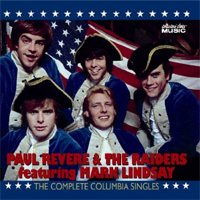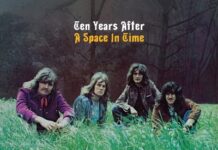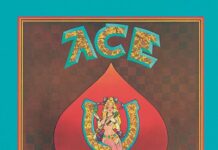Today, they are a fixture in Branson. Back in the mid 1960s, however, Paul
Revere & The Raiders Featuring Mark Lindsay were a rock n’ roll hit
machine that rivaled the Beatles and the Rolling Stones. Emerging from the Pacific
Northwest, the group successfully aligned their R&B roots with the sensibility
of the descending British Invasion — even donning American Revolutionary
garb in an effort to play up the fact that they’re were ready to battle
the Brits for chart domination. Teetering on the brink of self-parody throughout
their career (they even had their own television show in 1968), Paul Revere
& The Raiders Featuring Mark Lindsay still had a solid lock on the most
important element: great tunes — the best of which is featured over three
CDs on The Complete Original Columbia Singles.
There isn’t a better place to start the Paul Revere & The Raiders
story than with their April 1963 recording of Richard Berry’s immortal
“Louie Louie.” There was only one hitch: rival band The Kingsmen.recorded
the same song in the same Portland studio in the same month with the same producer
(imagine that?). Music business politics supposedly prevented the Raiders from
enjoying the success the Kingsmen did with “Louie Louie.” That,
however, didn’t stop them from having an on-again off-again love affair
with the charts for the next eight years.
The 66 songs comprising The Complete Original Columbia Singles
are a mixed bag of highs and lows for one of the more renowned garage bands
of the 60s. Teaming with producer Terry Melcher in 1964, Paul Revere & The
Raiders Featuring Mark Lindsay set a steady course for the charts that wielded
some truly magnificent classics. They attempted to capitalize on the failure
of “Louie Louie” by recording “Louie – Go Home”
and “Have Love, Will Travel,” with a ferocious vocal from Lindsay.
Unfortunately, both tunes — featured on this collection — failed
to make the intended impact. Nevertheless, the band’s feel for R&B
rhythms and rock n’ roll savvy shines through on supercharged instrumentals
(check out “Night Train,” and B.F.D.R.F. Blues,” to name a
few) and pop vocal singles.
Paul Revere and The Raiders Featuring Mark Lindsay would benefit greatly from
songs written by others, but their soulful stride is no more evident than on
their own, “Steppin Out.” Barley missing the Top 40, the song is
highlighted by the lead guitar line from Drake Levin and the assured vocals
of Lindsay. Three months later, they’d tap songwriters Richard Dey and
Roger Hart for “Just Like Me,” and make the big leap to Number 11.
Keeping the momentum going, Barry Mann and Cynthia Weil (inducted into the Rock
And Roll Of Fame in 2010) gave them “Kicks” and “Hungry,”
both of which landed in the Top 10. In 1966, Paul Revere and The Raiders were
one of the biggest bands in America.
Chart positioning was hit and miss for the Raiders, but that didn’t stop
them from recording gobs of catchy and edgy singles like “Ups And Downs”
(it made it to #22), “Him Or Me – What’s It Gonna Be?”
(a #5 hit), “I Had A Dream (#17), “Peace Of Mind” (#42). Like
so many of their peers, the Raiders had internal dissension, and certain key
members such as Levin and drummer Mike “Smitty” Smith left in a huff.
The Paul Revere and The Raiders gravy train went on unabated with other players,
some times studio musicians, tons of television (The Smothers Brothers,
Batman and even their own shows) and more hits. By 1968, Lindsay had
taken over a chief songwriter and producer. In the midst of the changing tide
of late 60s styles, audiences and politics, songs like “Happening ‘68”
and “Observation From Flight 285 (In 3/4 Time)” offer a longer,
more introspective view of the group. Meanwhile, radio-friendly blitzes like
‘Don’t Take It So Hard” and “Let Me” (along with
commercial tie-ins like “Judge GTO Breakaway” and “Song For
Swingy”) kept the Raiders on the frontlines until the end of the decade.
By 1970, it would have been easy to write off Paul Revere and The Raiders Featuring
Mark Lindsay , but that wasn’t going to happen without one last shot to
the top. By this time, the Revolutionary outfits were gone and the name was
briefly shortened, perhaps in light of Lindsay’s contributions, to simply
The Raiders. The album Collage, highlighted by the slick rocker
“Just Seventeen,” showed some promise of a rebirth, but it fell
flat for fans of the band’s glory days. Then, John D. Loudermilk’s “Indian
Reservation,” originally intended for Lindsay’s solo album, became
a Raiders single and it was 1965 all over again. How it went to Number 1 in
1971 is what kept the group going — perseverance and promotion on part
of Paul Revere. Other attempts to contemporize their sound never panned out,
and by 1975, Lindsay left The Raiders for good.
The breadth of Paul Revere & The Raiders Featuring Mark Lindsay can be
accurately measured by the three CDs in The Complete Original Columbia
Singles. Despite numerous personnel changes, alterations and exposure
in markets that came off “unhip” to certain followers, the music
is what matters the most. Listening back, it’s easy to pick up on how
influential and powerful the group could be. This is one garage band that successfully
graduated from the back alley to the world’s stage without missing a beat.
~ Shawn Perry




















